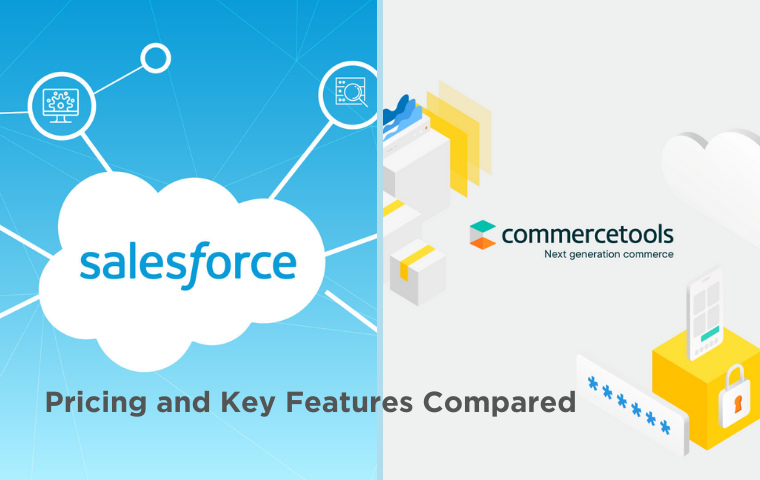TABLE OF CONTENT
Salesforce vs commercetools: How do they work?
Overview Comparison Table: Salesforce vs commercetools
Which Key Differences between Salesforce vs commercetools?
Salesforce vs commercetools: Your Business Prefers Which One?
Conclusion
Salesforce vs commercetools: How do they work?
Salesforce
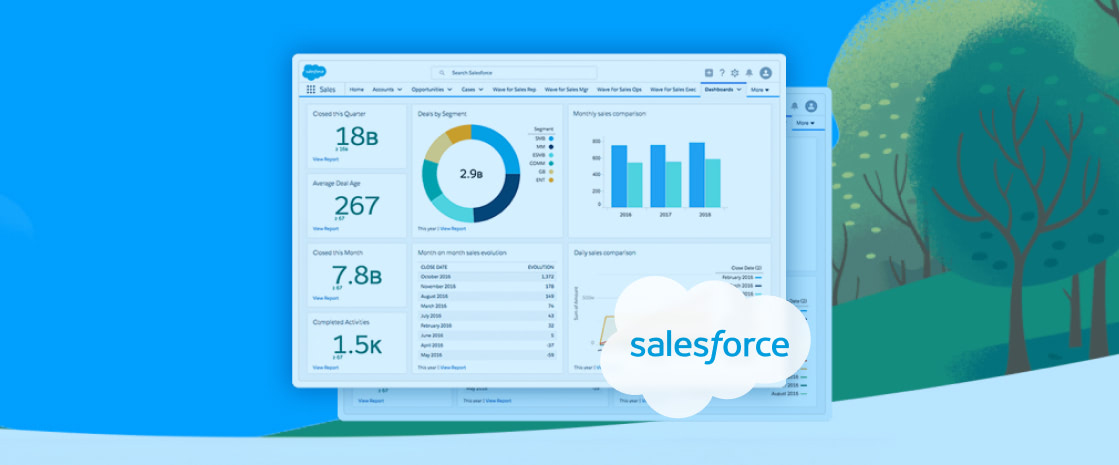
Salesforce, when comparing between Salesforce vs commercetools, is a comprehensive customer relationship management (CRM) platform. It offers many unique tools and features to help ecommerce businesses effectively manage customer data, track potential customer behavior, and nurture loyal customer relationships associated with the sales process.
Salesforce has a fairly intuitive interface and easily customizable dashboard. At the same time, this platform also allows you to integrate many third-party utilities, along with extensive automation capabilities. Your business will easily automate repetitive tasks and build truly meaningful, touch-point connections with customers.
A signature feature of Salesforce is Salesforce Einstein, an analytics tool powered by AI. With this feature, you can quickly gain valuable analysis on customer behavior and activity trends. Your business will quickly make decisions about further suitable marketing campaigns or business strategies based on these thorough and automated analytics on Salesforce.
commercetools
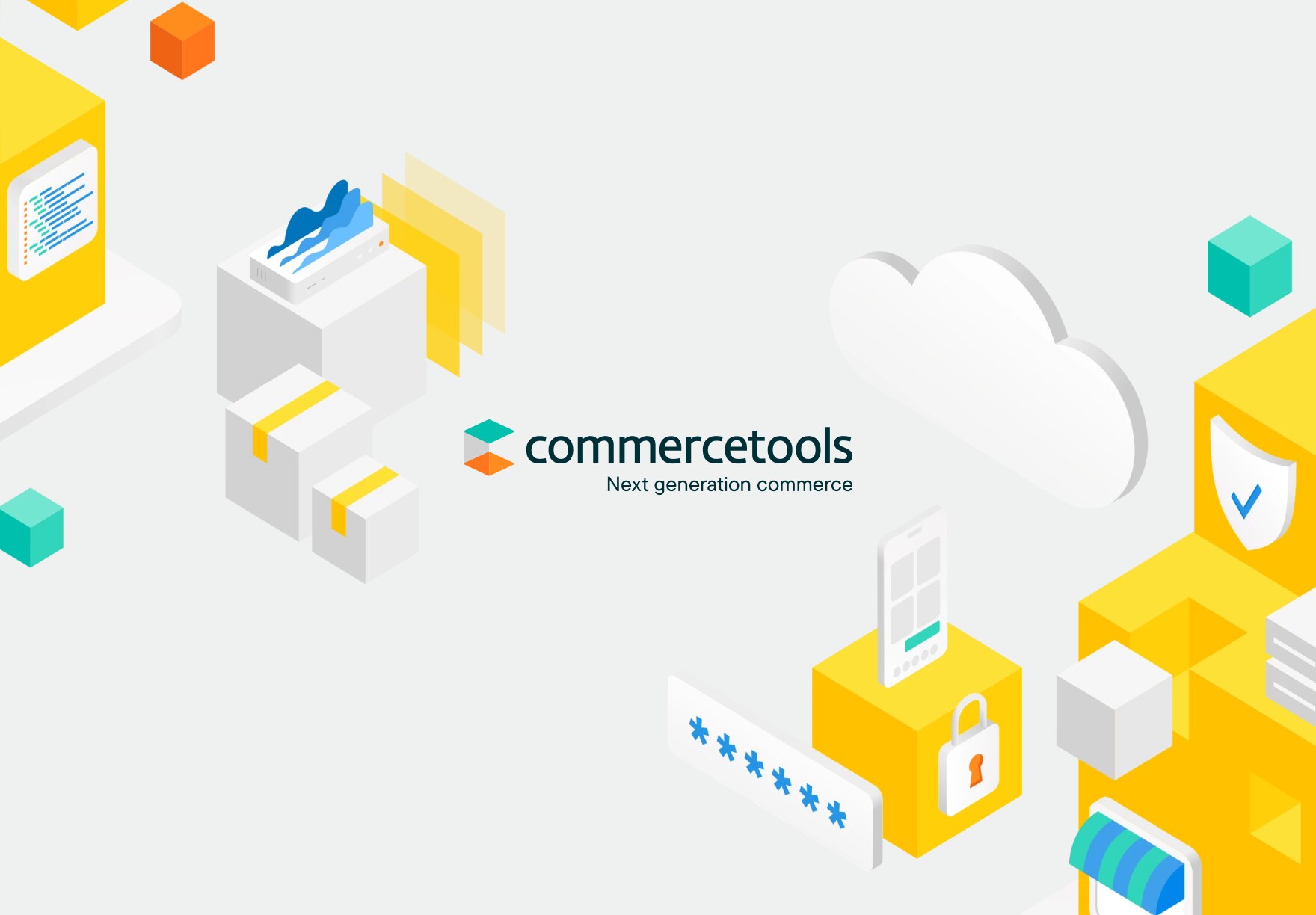
commercetools is a cloud-based commerce platform that helps ecommerce businesses build personalized and seamless customer experiences across multiple channels. Oriented to operate in a headless architecture, commercetools brings flexibility to businesses in adapting to the changing trends of the ecommerce market every second by easily editing each group of microservices, testing new touch points, or discovering unexpected errors without affecting the entire infrastructure.
Leveraging APIs, the platform, when comparing between Salesforce vs commercetools, also offers outstanding opportunities for businesses to integrate with various front-end solutions such as websites, IoT devices, mobile applications or even voice assistants. This makes your shopping experience and website visit consistent across all platforms.
Some popular features of commercetools:
- Product Information Management (PIM)
- Flexible pricing
- Provide promotions
- Automatic category management
Overview Comparison Table: Salesforce vs commercetools
| Criteria | Salesforce | commercetools | Verdict |
| Pricing | Traditional cost model, annual fees based on number of users and total revenue | Consumption-based pricing model; Pay for resources used | commercetools |
| Ease of Use | User-friendly interface; The dashboard can be easily customized | Focus on flexibility and customization, requires technical understanding | Salesforce |
| Marketing Features | Comprehensive suite of marketing tools, seamlessly integrated with other Salesforce clouds | Modular approach, relying on third-party integration | Salesforce |
| Multichannel Integration | Strong integration capabilities, connecting multi-channel businesses | The headless architecture enables seamless integration across various digital touchpoints | Salesforce |
| Scalability and Expansion | Scalable to support heavy traffic and global operations | Flexibly customize scaling solutions to specific business needs | commercetools |
| Community Support | Crowded, vibrant, sharing knowledge and supporting problem solving | Not too big, valuable technical support, active help | Salesforce |
| Customization | Configurable and pre-built integrations, allowing for high customization | Modular architecture and extensive API set, allowing for easy customization of ecommerce solutions | commercetools |
Which Key Differences between Salesforce vs commercetools?
Pricing
Salesforce
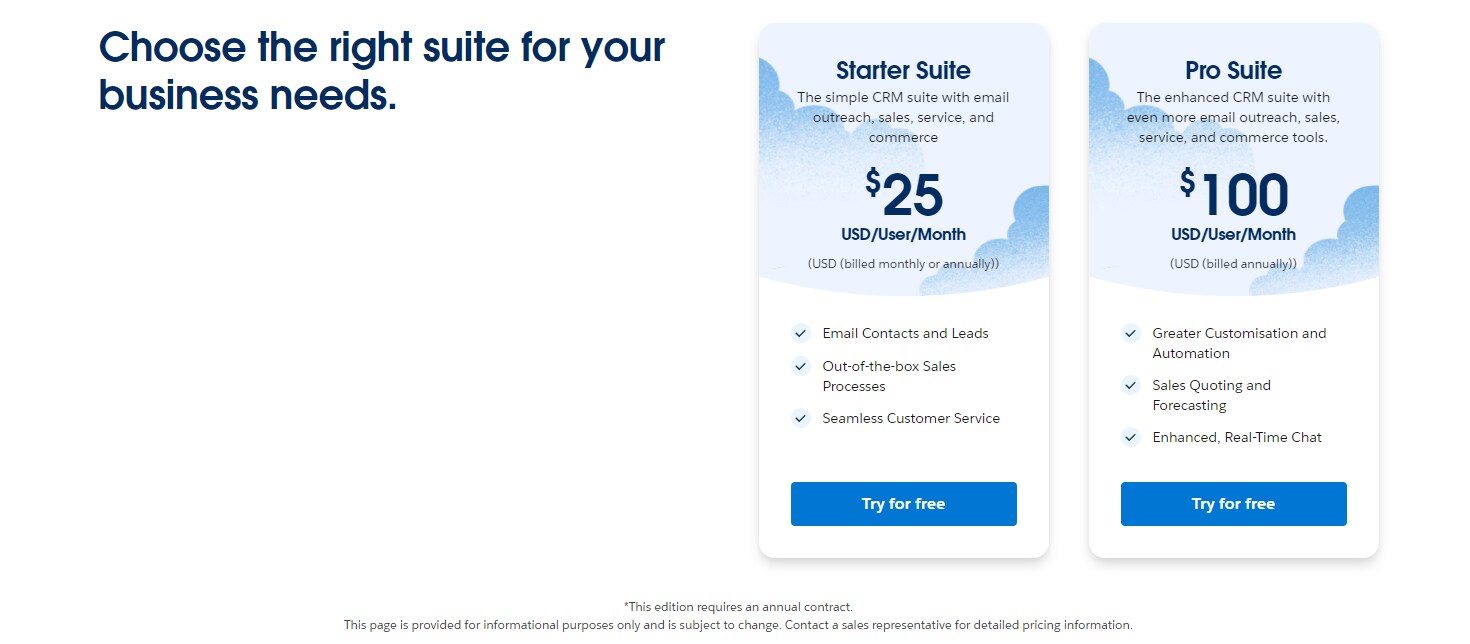
Salesforce Commerce follows a traditional paid model. Businesses using this platform will pay an annual usage fee based on the number of users and revenue generated.
The typical pricing structure will include a base cost, plus additional costs with many other add-ons included. That’s why many businesses choose Salesforce if they want to scale quickly with a clear, transparent cost structure at each point of use.
With Salesforce for small businesses, you can choose between 2 pricing plans:
- Starter Suite: $25/user/month. Key features: email contacts and leads, out-of-the-box sales process, seamless customer service, etc.
- Pro Suite: $100/user/month. Key features: greater customisation and automation, sales quoting and forecasting, enhanced and real-time chat, etc.
However, you should note that Salesforce’s pricing model based on a percentage of total revenue will mean the amount of money to pay becomes more expensive. This is especially important when a business is growing and undergoing rapid expansion.
commercetools
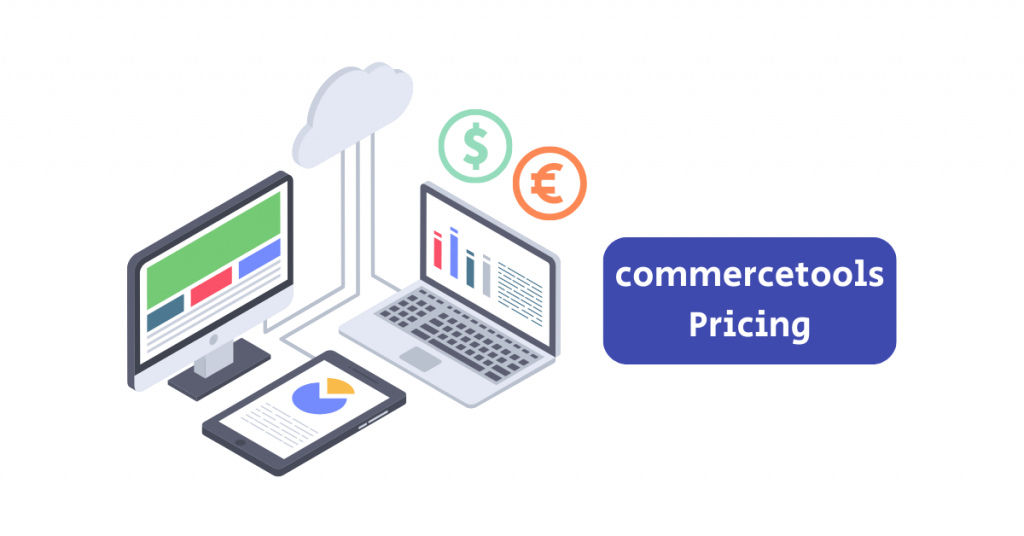
commercetools calculates costs for users based on consumption and resource usage. This approach allows business owners to save costs and be more flexible in fee planning compared to the traditional fee model. This is a particular plus for businesses that often experience spikes in traffic during any period of the year, or have fluctuating sales volumes.
In addition, this model also allows you to easily scale without incurring large upfront costs, or paying too much for an all-in-one service that leaves many unused resources.
Verdict
When comparing the price between Salesforce vs commercetools, commercetools is the winner. Pricing based on user consumption, commercetools allows businesses to optimize ecommerce costs, allocate resources effectively and drive better ROI based on the unique needs of each business.
Ease of Use
Salesforce
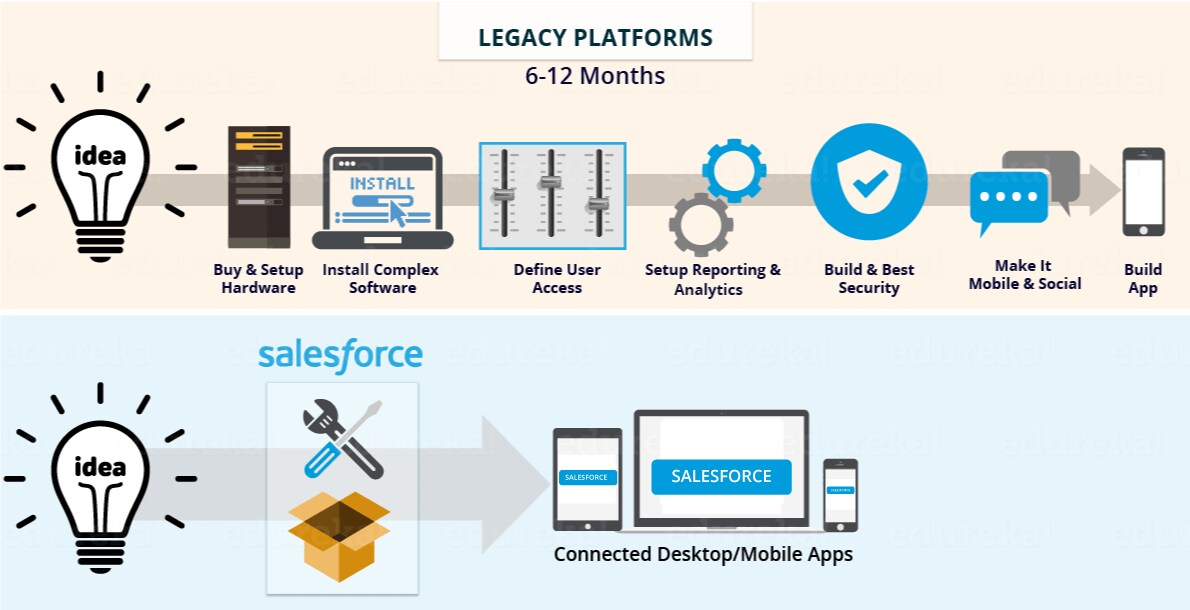
Salesforce provides a user-friendly interface that helps you easily and quickly manage your business’s ecommerce activities even without a deep technical background. The platform offers a customizable dashboard and drag-and-drop functionality, helping you quickly create an attractive storefront, proactively manage your product catalog, and streamline your order fulfillment process.
Besides, when using Salesforce, you will also have the opportunity to take advantage of a rich treasure of documentation, tutorials, and community support. Any questions can be resolved thanks to advice from experienced experts and successful case studies. However, be sure to take the time to thoroughly learn about Salesforce so you can effectively take advantage of the features and customization options it offers.
commercetools
commercetools with headless architecture allows businesses to easily edit and flexibly expand. However, this will be quite a difficult challenge for business owners who do not have dedicated resources. commercetools, when comparing between Salesforce vs commercetools, requires the development team to have minimal or in-depth knowledge of microservices-based architecture and API. The empowerment of commercetools’ users is also a special barrier to the knowledge and skills of business owners.
That’s why when choosing to use commercetools, many ecommerce business owners like you decide to cooperate with a consulting agency to optimize the process of building and operating the business.
Verdict
In terms of ease of use, Salesforce clearly wins when comparing Salesforce vs commercetools. With a user-friendly interface, extensive documentation and a large support community, Salesforce allows you to easily get acquainted with the platform and quickly launch your business on an ecommerce platform.
Marketing Features
Salesforce
When you use the Salesforce platform, you’ll be provided with a powerful set of marketing features that can quickly drive engagement, conversions, and loyalty.
Some popular tools to increase marketing efficiency for businesses on the Salesforce ecommerce platform include email marketing, personalization solutions, and recommending targeted ads based on behavior and customer attitudes.
Additionally, integration with other Salesforce Clouds is also easy when using Salesforce Commerce, such as Marketing Cloud or Service Cloud. This eases the process of creating a seamless multi-channel experience, and leverages existing customer data captured automatically at each touchpoint to enhance marketing strategy and business results in the near future.
commercetools
With commercetools, the marketing features are not too many and varied, as it mainly focuses on providing commerce infrastructure. Of course, commercetools, in the comparison between Salesforce vs commercetools, still provides APIs and integration services, allowing businesses to connect with third-party marketing tools and services, such as email marketing or customer data platforms (CDP). However, it is important to remember that these applications are not available on the commercetools platform, nor do they include extended functionality.
Typically, businesses using commercetools leverage headless architecture to proactively customize marketing solutions based on the unique needs of their customer base. However, technical factors also need to be considered in this journey.
Verdict
Salesforce continues to win the Salesforce vs commercetools comparison in terms of marketing features. A fully integrated suite of marketing tools and seamless connectivity with other Salesforce Clouds provide a seamless solution for executing targeted marketing campaigns.
Multichannel Integration
Salesforce

Salesforce allows ecommerce businesses to integrate powerful multi-channels, seamlessly integrating different sales channels, from offline sales to online sales through social media platforms (Instagram, Facebook) or marketplaces (Amazon, eBay).
Besides, Salesforce’s unified platform also eliminates all your difficulties in syncing inventory, orders and customer data in real time, ensuring a consistent and personalized shopping experience on every channel.
Salesforce’s partner ecosystem also provides access to more third-party extensions and integrations, further enhancing businesses’ omnichannel capabilities.
commercetools
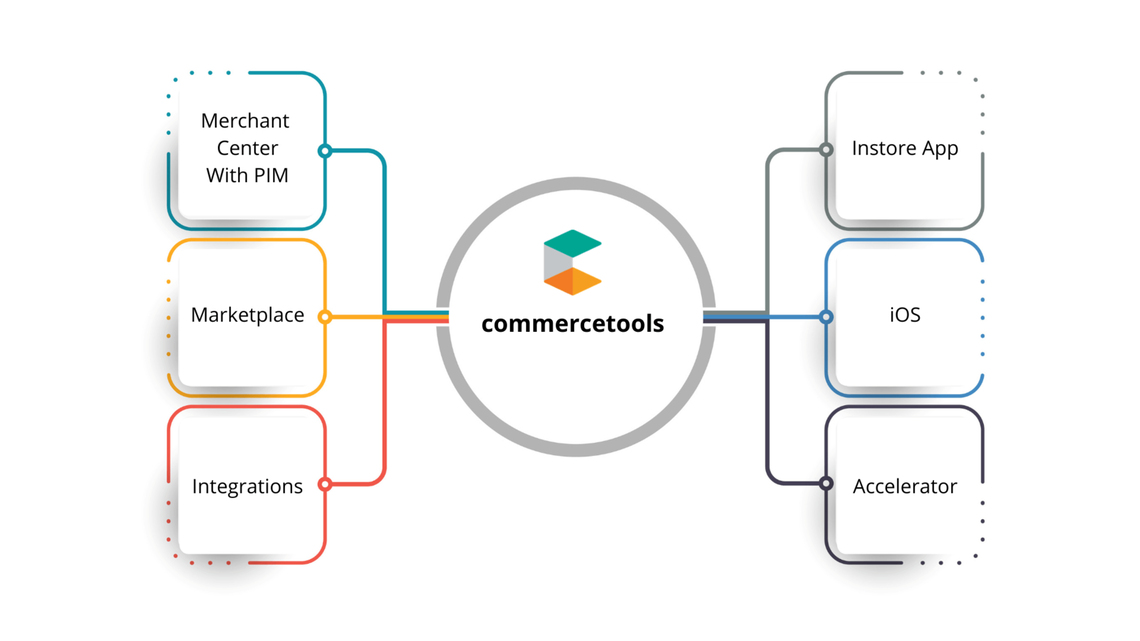
Still standing out with its headless architecture, commercetools allows businesses to integrate multiple channels, expanding shopping experiences across many different digital touchpoints, including websites, mobile applications or IoT devices.
This approach allows your digital store to easily integrate with third-party platforms and services.
However, one thing we have been emphasizing all along in the comparison of Salesforce vs commercetools is the technical expertise or development resources to understand and utilize the full potential of commercetools.
Verdict
In terms of multi-channel integration when comparing Salesforce vs commercetools, Salesforce has the upper hand. The platform has a large integrated ecosystem, allowing businesses to create seamless, multi-channel sales and diversify customer shopping experiences.
Scalability and Expansion
Salesforce

Salesforce provides a powerful infrastructure with the ability to handle large traffic volumes and a rich product portfolio. The platform is packed with special features for load balancing, caching, and flexible scaling. This behavior by Salesforce allows businesses to scale their ecommerce operations seamlessly when growing in a new market, for example.
In addition, applying cloud-based architecture also helps Salesforce ensure great reliability and performance in the Salesforce vs commercetools comparison, improving sustainable infrastructure performance.
commercetools
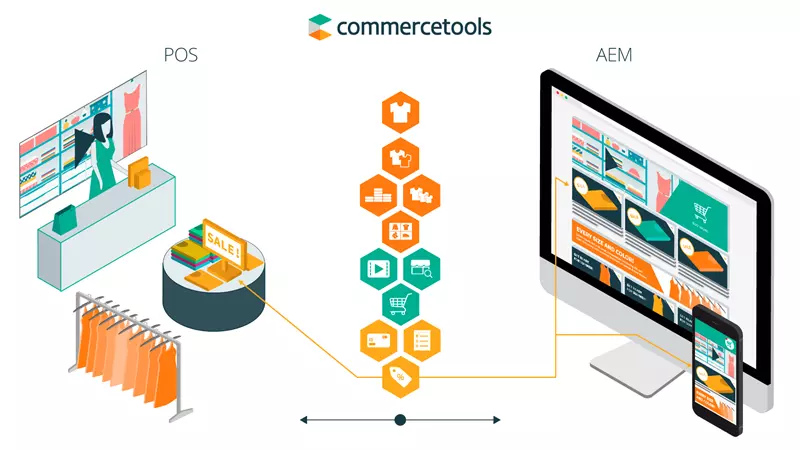
With commercetools, its flexible scalability cannot be denied. However, adopting headless architecture in its operations puts much of the responsibility of infrastructure management and scaling on the enterprise itself. This gives you full autonomy in deciding and orienting the scale, field, and area of expansion. However, you also need to consider investing in technical expertise or additional resources to optimize scalability on the commercetools platform.
Verdict
In terms of scalability, commercetools has many advantages when comparing Salesforce vs commercetools. Although there is a certain requirement for technical expertise related to ecommerce, commercetools allows users to be flexible and comfortable in infrastructure development. This is an important factor for the platform to develop alongside businesses in the volatile market of ecommerce.
Community Support
Salesforce
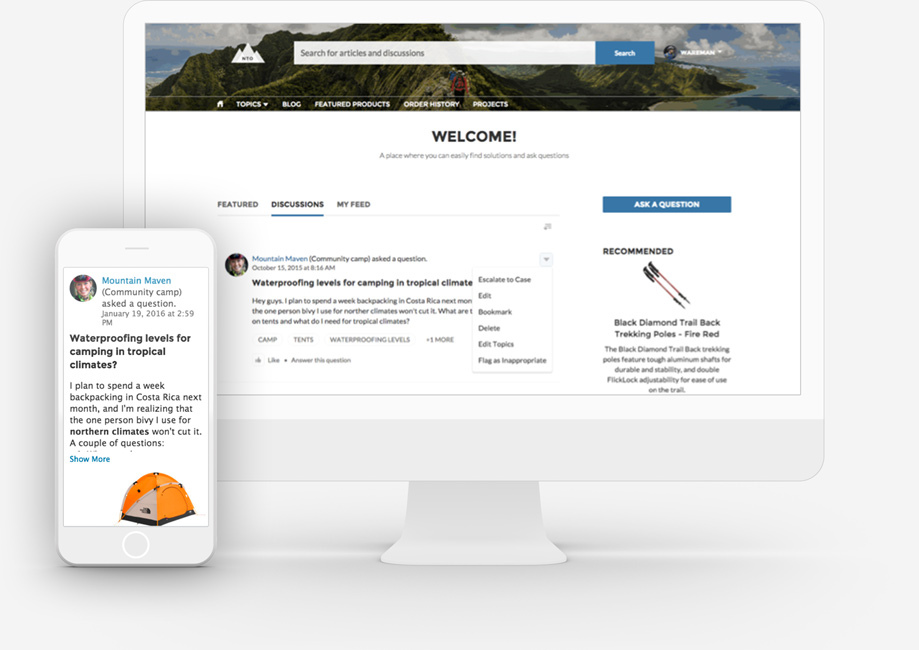
Salesforce owns a large customer data set (because the platform itself has been operating sustainably and for a long time in the ecommerce market). Not only does it have comprehensive support packages, Salesforce also allows users to access an extremely rich treasure of knowledge and expertise.
They are ready to share with you their knowledge, solve difficult problems, and decode tips to optimize all the features of Salesforce Commerce Cloud. A large community and abundant available resources are enough so that you will not be too confused the first time using the platform.
commercetools

commercetools is inherently a new platform, so the community supporting and using the platform is not too large. Besides, commercetools also thoroughly grasps the current mission of being developer-centered. The commercetools developer community still exists and is increasingly growing, aiming to provide knowledge from basic to advanced, as well as discuss application methods and troubleshooting during the use of commercetools.
Verdict
Comparing between Salesforce vs commercetools with community support features, Salesforce is somewhat more outstanding. Operating for a long time, Salesforce has a large community and strong support ecosystem, helping businesses quickly get their questions answered and take full advantage of the platform’s features from the experience of users.
Customization
Salesforce
Salesforce offers a variety of services that cater to the increasing customization needs of ecommerce businesses over time. The platform offers extensive customization options through configurable settings, with an intuitive interface that is truly easy to use.
However, Salesforce’s biggest strength when it comes to this area is its ability to streamline ecommerce operations without requiring too much coding expertise. So business owners like you can take advantage of Salesforce’s valuable ecosystem of integrations and extensions to customize your storefront, manage your product catalog, and launch targeted marketing campaigns. At the same time, businesses can still adapt to development activities without being affected too much.
commercetools
commercetools takes a modular approach to customization and quickly empowers developers to build highly customized ecommerce solutions. Of course, it is impossible not to mention the effects of commercetools’ unique set of APIs and microservices-based services in this Salesforce vs commercetools comparison.
By leveraging an API-first approach and these technical services, businesses using commercetools easily integrate with third-party services, expand functionality, and create unique digital commerce experiences for their customers through each stage of development.
Verdict
commercetools is the winner when comparing Salesforce vs commercetools in terms of customization. With its modular architecture and extensive API set, the platform gives businesses great flexibility to build highly customized digital stores, streamlining every operation throughout the process of management and operation.
Salesforce vs commercetools: Your Business Prefers Which One?
Salesforce is best suited for your business if…
If your business values simplicity, convenience, and a comprehensive collection of available key features, Salesforce is the perfect ecommerce solution. With an extremely user-friendly interface, rich documentation and a strong support community ecosystem, Salesforce is capable of helping businesses launch and scale online. Are you worried about your limited technical potential? Salesforce is the complete answer you are looking for after the comparison of Salesforce vs commercetools.
commercetools is best suited for your business if…
If your business prioritizes flexibility, customization, and scalability, commercetools is the key solution. With no front end and headless architecture, commercetools empowers business owners and development teams to proactively customize their digital stores. This ensures a close fit with businesses that want to create truly differentiated customer experiences, have advanced customization and are passionate about experimenting with emerging technologies.
Conclusion
The difference between Salesforce vs commercetools comes from deploying models to each individual feature. Obviously, they are for different users, with different standards and purposes. Our article has frankly mentioned the strengths and limitations when it comes to each key feature, thereby helping you quickly understand which platform is more suitable for your business.
Of course, it would be understandable if you still don’t really understand all the differences between Salesforce vs commercetools. Or, you find it too difficult and time-consuming to learn thoroughly about both platforms, as well as too busy to learn how to operate them fluently and use them most effectively. Don’t worry, because we, AHT Tech, are still here and accompanying you. 1000+ ecommerce projects, 25+ partners who are global ecommerce platforms including Salesforce, and a team of 500+ experts ready to advise and operate in the business’s ecommerce development process, these are the proofs representing the quality of service that AHT Tech guarantees to bring.
Don’t hesitate to contact us as much as possible for more detailed information. You can also watch this video below for more understanding about our ecommerce service.


